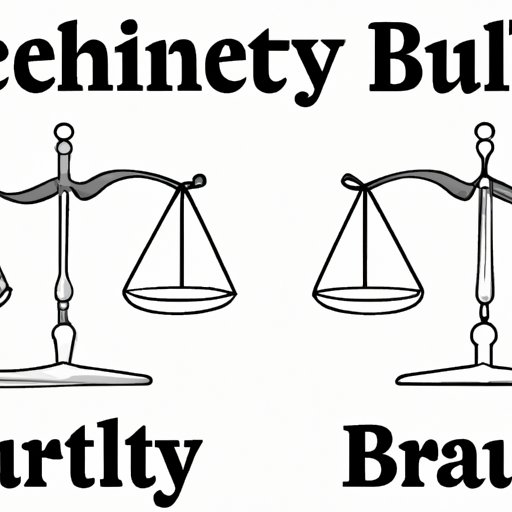Overview of Jury Trial Process, from Selection to Verdict
A jury trial is a legal proceeding in which a jury is selected to hear evidence presented by both parties in a lawsuit, and then make a decision on the outcome. It is the most common form of trial in the United States and is used in both criminal and civil cases. The jury trial process begins with the selection of a jury and ends with the jury delivering its verdict.

Definition of a Jury Trial
A jury trial is a formal judicial proceeding where a group of people, called jurors, listen to the arguments made by the prosecution and defense in a criminal or civil case. The jurors are then expected to render a verdict based on their interpretation of the facts presented in the trial. A jury trial is usually conducted before a judge and may include witnesses, experts, lawyers, and other parties involved in the case.

Who is Eligible to Serve on a Jury
In order to be eligible to serve on a jury, a person must be a U.S. citizen aged 18 or older and a resident of the county or state where the trial is taking place. Additionally, potential jurors must not have any felony convictions and must be able to understand English. In some states, individuals with certain medical conditions may also be ineligible for jury duty.
How a Jury is Selected
The jury selection process begins with a pool of potential jurors being summoned to the courthouse. During this process, the court clerk will ask each prospective juror a series of questions to determine if they are eligible to serve. If eligible, the prospective juror will be sworn in and instructed to sit in the jury box until the attorneys have decided whether or not to accept them as a juror.
What Happens During a Jury Trial
Once the jury has been selected, the trial officially begins. During the trial, both sides will present their evidence to the jury. This includes opening statements, witness testimony, expert testimony, and closing arguments. Throughout the trial, the judge will instruct the jury on how to interpret the evidence being presented. After all of the evidence has been presented, the jury will retire to a private room to deliberate and reach a verdict.
The Role of the Judge and Attorneys in a Jury Trial
The judge is responsible for ensuring that the jury trial runs smoothly and fairly. The judge will make sure that all witnesses are treated fairly and that the jury follows the law. The judge also has the power to instruct the jury on how to interpret the evidence presented during the trial. The attorneys for both sides will present the evidence and argue their case before the jury. They will also question witnesses and make objections when necessary.
Verdicts and Post-Verdict Proceedings
When the jury has reached a verdict, they will return to the courtroom and announce their decision. The judge will then read the verdict, which will either find the defendant guilty or not guilty. If the defendant is found guilty, the judge will sentence them according to the applicable laws. After the verdict is read, the post-verdict proceedings begin. These proceedings may include appeals, motions, and other legal actions.

Exploring the Rights of Jurors During a Jury Trial
Jurors have certain rights that help ensure that they can make an informed decision. These rights include the right to be informed about the case, the right to ask questions, the right to challenge for cause, and the right to participate in jury deliberations.
Definition of Juror Rights
Juror rights are specific rights that are granted to jurors in order to ensure that they can make an informed decision about the case. These rights include the right to be informed about the case, the right to ask questions, the right to challenge for cause, and the right to participate in jury deliberations.
Juror Qualifications
In addition to being a U.S. citizen and a resident of the county or state where the trial is taking place, jurors must also meet certain qualifications. These qualifications include being able to understand English, being over the age of 18, and not having any felony convictions. Potential jurors may also be asked if they have any biases that may prevent them from making an impartial decision.
Challenges for Cause and Peremptory Challenges
During jury selection, both the prosecution and defense may make challenges for cause. These challenges are used to remove potential jurors who may not be impartial or may have a bias against one of the parties. Additionally, the prosecution and defense may make peremptory challenges, which allow them to remove potential jurors without giving a reason. These challenges are limited in number and can only be used when there is no clear cause for the challenge.
Jury Deliberations
Once the jury has heard all of the evidence, they will retire to a private room to deliberate. During these deliberations, the jurors will discuss the evidence and try to reach a unanimous verdict. The jurors are allowed to ask questions and express their opinions, but they must remain impartial and follow the instructions given by the judge.

Analyzing the Pros and Cons of Having a Jury Trial
Having a jury trial has both advantages and disadvantages. The following section will explore the pros and cons of having a jury trial.
Advantages of a Jury Trial
One of the major advantages of having a jury trial is that the jury is composed of ordinary citizens. This means that the jury is more likely to be impartial and unbiased. Additionally, the jury is able to make decisions based on the evidence presented, rather than relying solely on the opinion of the judge. Finally, having a jury trial allows the parties to have their day in court, which can provide closure and justice for the victim.
Disadvantages of a Jury Trial
One of the main drawbacks of having a jury trial is that it is often expensive and time consuming. Additionally, the jury may not always be impartial or knowledgeable enough to make an informed decision. Finally, the jury’s decision is final and cannot be appealed, which can sometimes lead to injustice.

Comparing Jury Trials to Bench Trials and Plea Bargains
Jury trials are not the only type of trial available. Other types of trials include bench trials and plea bargains. The following section will compare jury trials to these other types of trials.
Bench Trials
A bench trial is a trial that is presided over by a judge, rather than a jury. During a bench trial, the judge will hear the evidence and make a decision based on the law. Bench trials are less expensive and quicker than jury trials, but the decisions are final and cannot be appealed.
Plea Bargains
A plea bargain is an agreement between the defense and the prosecution in which the defendant agrees to plead guilty in exchange for a lesser sentence or reduced charges. Plea bargains are often used to avoid the expense and time of a jury trial. However, plea bargains can sometimes lead to injustice, as the defendant may be forced to plead guilty even if they are innocent.
Differences Between Jury Trials, Bench Trials and Plea Bargains
The major difference between jury trials, bench trials and plea bargains is the way in which the decision is made. In a jury trial, the decision is made by a jury of ordinary citizens. In a bench trial, the decision is made by a judge. And in a plea bargain, the decision is made by the defendant and the prosecution.
Conclusion
Jury trials are the most common form of trial in the United States, and they play an important role in the legal system. The jury trial process begins with the selection of a jury and ends with the jury delivering its verdict. Jurors have certain rights that help ensure that they can make an informed decision. Additionally, there are advantages and disadvantages to having a jury trial. Finally, jury trials can be compared to bench trials and plea bargains. Understanding the jury trial process is essential for anyone involved in the legal system.
(Note: Is this article not meeting your expectations? Do you have knowledge or insights to share? Unlock new opportunities and expand your reach by joining our authors team. Click Registration to join us and share your expertise with our readers.)
